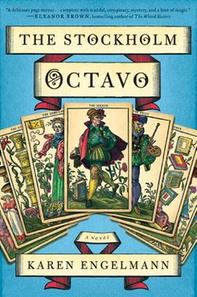 The Stockholm Octavo, Karen Engelmann's impressive debut, is as marvelously and intricately constructed as the mysterious form of divination it's named for. As a young bachelor searches for his fate in the rococo ballrooms and shadowy taverns of Sweden's Gustavian age, Engelmann weaves in a fastidiously researched (and thrillingly written) story where regimes are toppled by the delicate flutter of a lady's fan and destinies revealed with the turn of a card.
The Stockholm Octavo, Karen Engelmann's impressive debut, is as marvelously and intricately constructed as the mysterious form of divination it's named for. As a young bachelor searches for his fate in the rococo ballrooms and shadowy taverns of Sweden's Gustavian age, Engelmann weaves in a fastidiously researched (and thrillingly written) story where regimes are toppled by the delicate flutter of a lady's fan and destinies revealed with the turn of a card.
Engelmann's narrator is man-about-town Emil Larsson, a contented bachelor and skilled gambler with a well-ranking bureaucratic job in the final decade of the 18th century, as fashionable Stockholm--called the "Town"--begins to feel the rumbles of revolution from distant France. "I have pieced the story together from fragments of memory--most with a tendency to flatter the memoirist," Emil warns in his preface. He supplements these "fragments" with information gathered from various sources, which he lists at the beginning of each chapter.
It all begins when Mrs. Sofia Sparrow, fortune-teller and proprietress of the exclusive gaming house where Emil spends much of his time, lays for him an octavo--a spread of eight cards, each representing a person destined to help bring about an event that will lead to transformation and rebirth for the seeker. "Think of it as destiny, partnering with free will," Mrs. Sparrow explains. Her vision for Emil, the resolution of the transformative event at the heart of his octavo, is simple: love and connection. If Emil can find his Eight, his good fortune will be realized.
But as Emil searches, conspirators threaten to end King Gustav III's golden reign and plunge Sweden into chaos. Emil's Eight--friends and traitors alike--are indelibly tied to the fate of the kingdom. Among them are an icy, conniving baroness, a French fan maker and his kind wife, a beautiful and ambitious war widow, a cross-dressing calligrapher and a shrewd runaway girl. As Emil identifies them one by one, and the Octavo's deeper powers are revealed, it becomes clear that there is far more at stake than his own happiness.
Emil is a good (if not entirely reliable) storyteller, but we must credit Engelmann for the rich prose, sensuous descriptions and the vivid, disparate characters that populate the novel. A true pleasure from beginning to satisfying end, The Stockholm Octavo will delight not only historical fiction fans but also readers with a taste for political intrigue--aided by the mysterious powers of cartomancy. --Hannah Calkins
Shelf Talker: Conspiracy brews underneath the chandeliers and across the gaming tables of 18th-century Stockholm, in a debut novel alight with color and magic.

